In this article, we are going to talk about the best and cheapest cloud hosting on the market. This is a type of hosting that more and more people will be using in the future. Even Google and Yahoo use this type of hosting, investing billions of Dollars for their applications.
This article will display the basics of cloud hosting, showing you the different models on the market and the way to find the best cloud host. In the end, you’ll have answers to the most frequently asked questions.
First, have a look at the hosts we talk about in this article to have an idea, as well as the opinions shared by the customers.
Comparison of the best Cloud hosting in 2024
| Hosting | Details | Scores | Actions |
|---|---|---|---|
Scalable & Cheap  |
| 9.9 | Start Free Trial |
Lightning Fast  |
| 9.6 | Start Free Trial |
Highly Flexible  |
| 9 | $50 Free Credits |
For Small Budgets  |
| 8.4 | Visit DigitalOcean |
For Beginners  |
| 7.8 | Visit HostingerHostinger (India) |
Cloud Hosting: All you need to know
What is cloud hosting?

The word “cloud” takes different meanings depending on the use: cloud storage isn’t the same as cloud hosting. The latter means a flexible and very modern way to manage your website.
Let’s first have a look at the most common benefits of this type of hosting: flexibility and reliability.
What was there before the cloud?
Before the cloud, web hosting meant renting a portion of the server space from a single physical device. Some types of hosting still work with this template. For example, if you rent an entire dedicated server, you can choose the server configuration within the device boundary.
Cloud hosting allows you to:
- Freeing up server limits: such as device limitations (example: RAM, CPU etc.)
- Create virtual servers: Combine the resources of a machine cluster rather than a single machine instance.
- Mitigate Traffic Peaks: Increase resources on the fly, through upgrading hosting plans to meet demand.
- Increased reliability: Copies of your site can be placed in multiple locations. This creates a second node ready to take over if the primary node fails.
- Better uptime: Some cloud hosts advertise much better uptime guarantees than any other type of hosting. It is not uncommon to see a 100% guarantee in some cases.
The cloud is a set of distributed servers

Cloud hosting is done on virtual servers that draw their computing resources from vast networks of clustered physical web servers. Some professionals see it more as a service and not as a product in the same way as water, electricity or gas.
In other words, the customer uses all the resources his website needs and only pays for what he used. The network of web hosting servers in the cloud is particularly large and comes, in most cases, from different data centers.
Different cloud hosts provide redundancy in different ways. Some will put your site on multiple storage devices, while others will use multiple virtual servers.
In addition, the cloud is often spread across different physical locations, providing additional protection against force major events. Some cloud hosts use load balancing technology to ensure that the virtual data center can meet demand as it increases or decreases.
The features of cloud hosting?

Beginners often don’t understand the meaning of cloud hosting.
Cloud hosting is composed of a physical space that stores data. In sum, it’s a network of servers that reside in several physical servers located around the world.
What is a cloud server?
A cloud server is a virtual server that runs in a unique computing environment. The building, the hosting and provisioning are done virtually. Therefore, the data isn’t present in a physical server, but it’s dispersed across a server network.
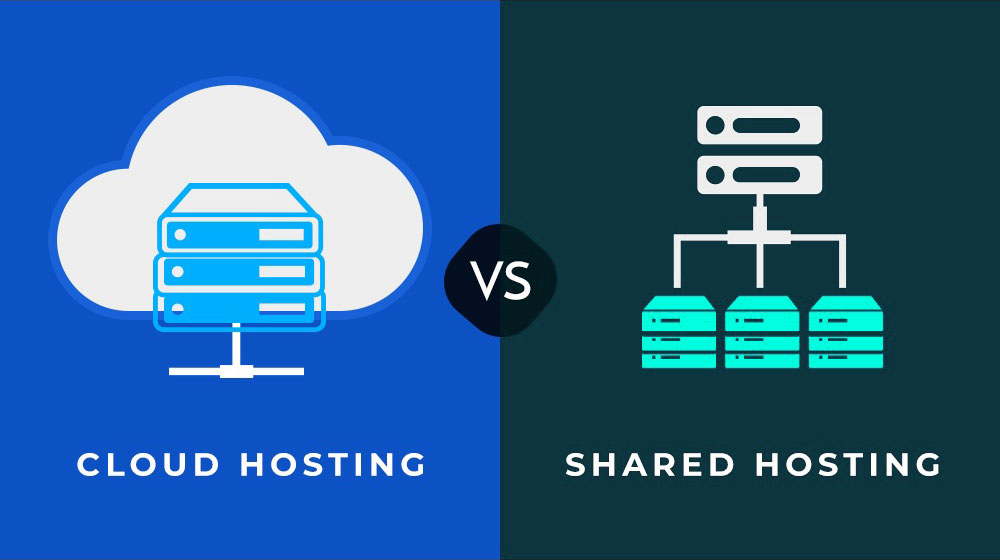
There are several differences between these two types of hosting.
On a shared server, the website is hosted on a physical server with many other users. Every single resource is shared between all the users: disk space, bandwidth, RAM… Therefore, the performance of your website is affected by other customers.
On the other side, with cloud hosting, you have many dedicated resources that aren’t shared because since you aren’t hosted on a physical server, you don’t share resources with anyone. Therefore, your website’s performance isn’t affected by other users’ activity.
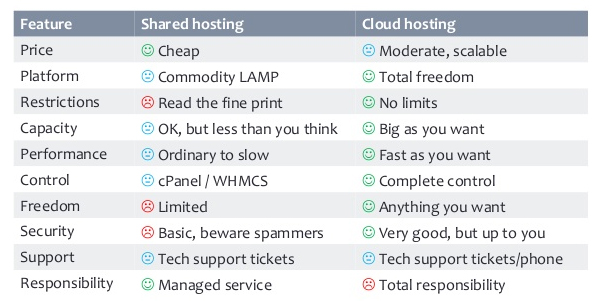
Reliability is crucial
The resistance to failures/errors of cloud hosting is much higher than for shared hosting. Indeed, the fact that your data will be spread across several physical locations prevents any type of problems, at least much more than with shared hosting.
What is the difference between cloud hosting and VPS hosting

People often confuse cloud hosting and VPS hosting… Well, they aren’t the same. VPS stands for Virtual Private Server, but cloud servers aren’t virtual machines.
In truth, cloud hosting and VPS hosting have some things in common:
- Both use virtualization at the heart of their service
- Both isolate virtual servers from clients so as not to hinder the services of others.
A virtual machine is a virtual computer that acts like a real computer, as software inside a physical computer, it isn’t physical. Yet, there are two common points between VPS hosting and cloud hosting. Both of them use what we call “virtualization”. Everything is virtual. Also, they both proceed to the isolation of the virtual servers to not depend on the other customers’ activity.
In sum, cloud hosting is almost the same as VPS hosting. Yet, the former spreads data among several virtual servers, while the latter allocates a part of a physical machine to each customer. The former is more scalable and customizable than the latter.
Difference between Cloud hosting and the dedicated server
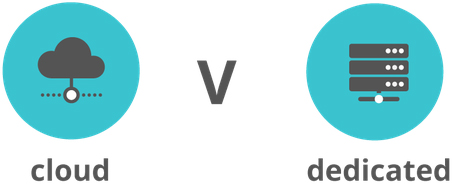
Dedicated servers differ from cloud hosting plans and VPS. In fact, when you buy a Dedicated server, you will have in your possession a whole server.
The dedicated server is a popular choice with large companies
Dedicated hosting is also different from Cloud hosting. When you choose dedicated server hosting, you have an entire server between your hands.
The dedicated server is a popular choice with large companies
Dedicated servers are often chosen by large companies for several reasons. First, it gives them more control by being able to configure the hosting environment as wished. Also, it guarantees more performance with a high level of security since the server is only allocated to your website.
VPS hosting and Cloud servers are less expensive but are the favorite option of SMEs and individuals.
What is cloud computing?

Do not confuse cloud hosting with cloud computing. The former is a form of the latter.
Indeed, cloud computing is the storage and access to the programs/data via the Internet by using a network of remote servers. For instance, it’s used when storing photos/documents on Google Drive.
When you store data on the internet and not on mobile devices, you use cloud computing. It’s becoming more and more popular.
5 benefits of cloud computing for businesses

Cloud computing has several benefits such as the free up of storage space from your devices. Also, you access your data from different devices. For instance, you will be able to have access to your email from your laptop, phone and tablet. It isn’t on a physical space, but on cloud servers.
For businesses, the cloud can certainly eliminate a lot of hassle, offering many benefits:
- Cost reduction
- Resources and storage
- Efficiency
- Flexibility
- Disaster recovery
Cost reduction
By having cloud storage, you reduce the costs of IT management. You won’t need to upgrade/repair your hardware if you want to solve a problem.
Also, the energy consumption is saved, as well as the cost of staff that would have to manage the physical equipment. Also, cloud hosts pay the repairing and maintenance costs.
Resources and storage
With cloud hosting, you only pay for the resources that you used, which means that the bill is adapted to your website and its content/traffic, not to a fixed amount.
Depending on their needs, websites that choose cloud hosting can scale very easily their storage.
Efficiency
With cloud hosting, employees can work collaboratively, which improves every team’s performance. Therefore, no need to send the updated files or check if it was received, etc. Everything is on the cloud server.
Flexibility
You can work simultaneously from different places on the same file (s) by editing or updating it. Employees don’t necessarily need to work from the office, but they can do so from their home, on a train…
Freelancers and remote employees can work very easily with this type of hosting.
Disaster recovery
With cloud computing hosting, disaster recovery is made easier. You will, therefore, be able to save money as well as time.
Different cloud computing hosting services

There are many cloud computing services. They can be in the form of apps like Dropbox and Google Drive to cloud hosting environments for websites.
Cloud hosts make cloud computing available to everyone, not just developers.
They often charge a monthly or yearly subscription to people who use their resources. You can usually choose to pay more for additional storage space or for more flexibility.
The best cloud services are those that allow file storage and sharing. These types of services allow you the following:
- Easily access your data wherever you are in the world and from any computer.
- View and share your photos with from your computer or someone else’s.
- Play your own music on your mobile phone or someone else’s.
It is obvious that these cloud services have a multitude of recreational and professional uses.
Security of Cloud Hosting: Public, Private, Hybrid
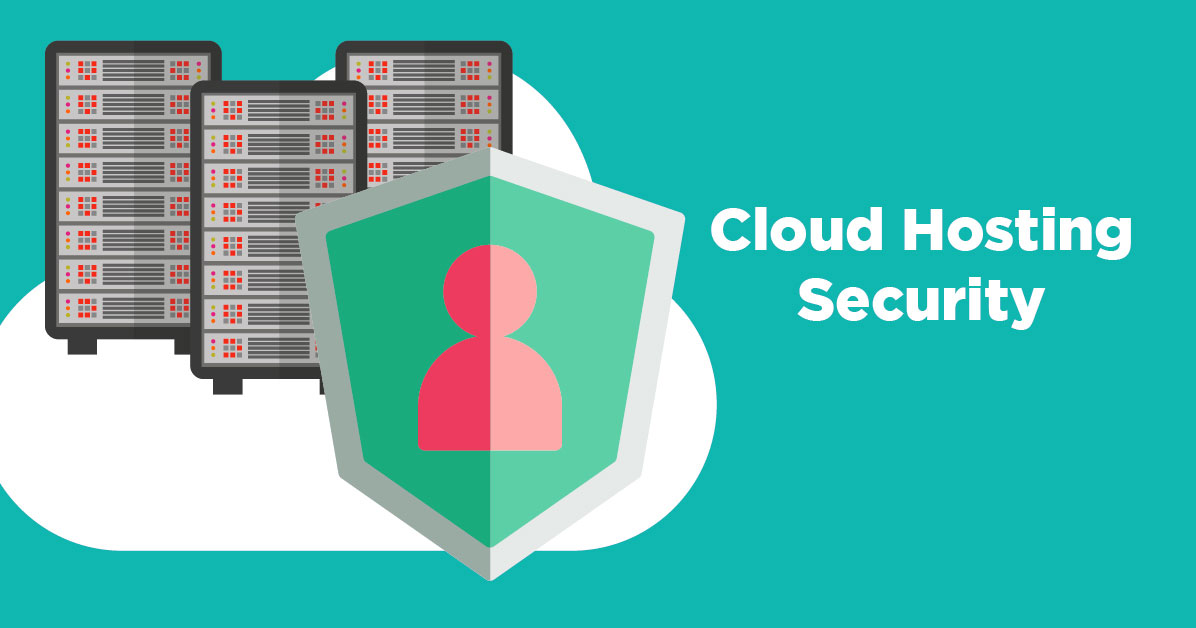
Many companies still hesitate about choosing cloud hosting because of its undetermined security level. Many reports are shared about this concern, but what you need to know is that cloud hosts only ask you to use a unique password without sharing it with anyone, and it also updates scripts. Therefore, the security level is basic.
Public Clouds
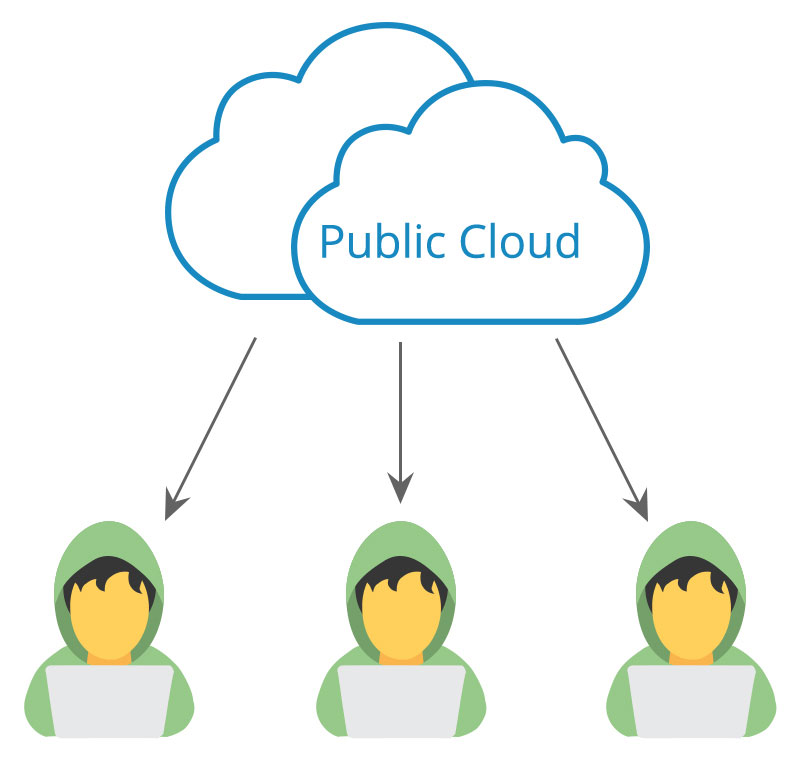
Cloud servers are virtualized environments that allow you to share computing resources thank multi-tenant architecture. Yet, every user’s data is isolated from the other customers’. The bandwidth connectivity is high enough to transmit data at a high speed.
Most websites are hosted by public clouds, which prevent from any kind of interference between websites. Most of the witnesses that the environment is perfectly secure. A private cloud is always better, but of course, it’s more expensive.
Private Cloud
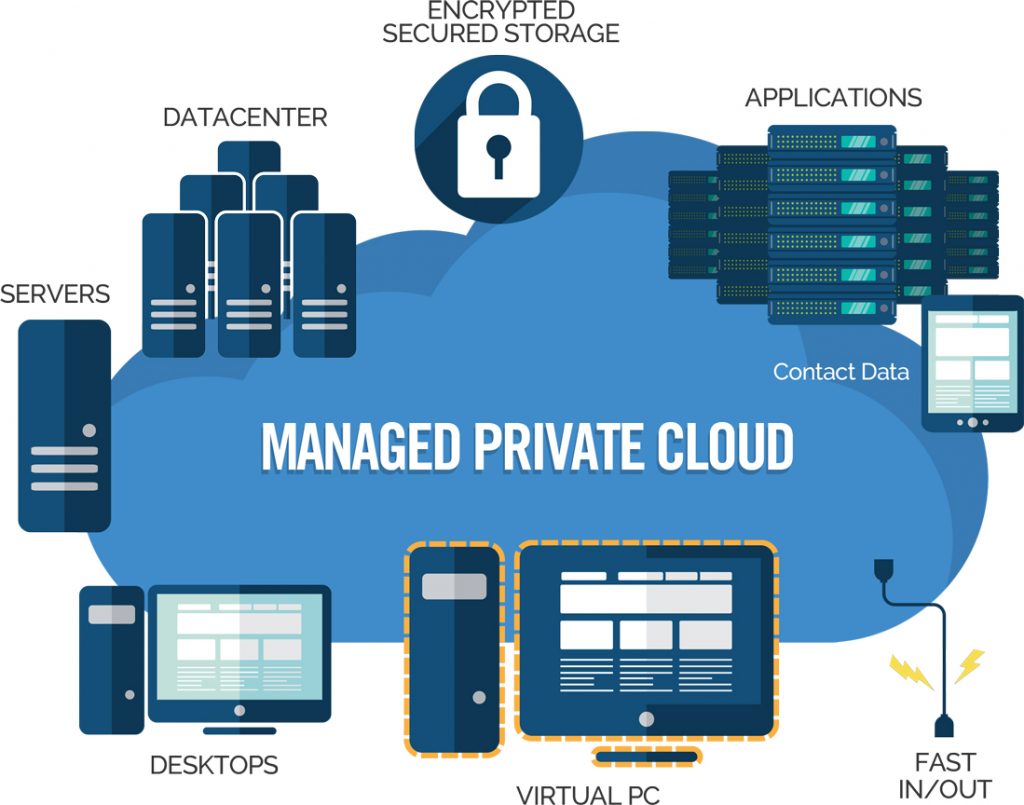 It’s a cloud computing architecture that is dedicated to a single organization. It’s different from the public cloud since it’s used as an extension of the existing data center. Also, the company is the only entity that has access to that data.
It’s a cloud computing architecture that is dedicated to a single organization. It’s different from the public cloud since it’s used as an extension of the existing data center. Also, the company is the only entity that has access to that data.
Hybrid Cloud
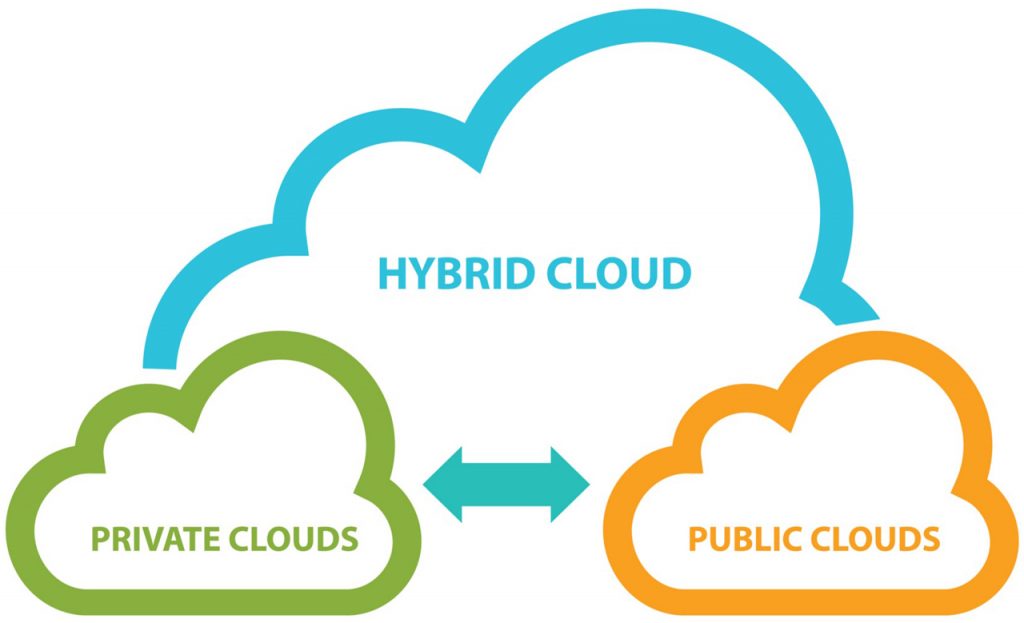
Internal and external suppliers have access to the management of this type of hosting. It’s the combination of the previous two cloud services. It’s extremely attractive because the organization is the same as the public cloud, but the maintenance is on the same model as the private cloud.
Understand what IaaS, PaaS and SaaS are
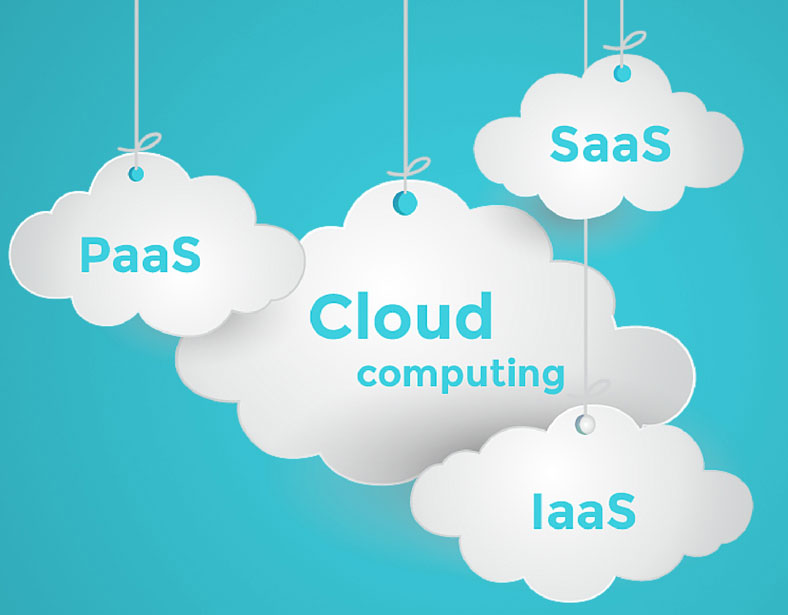
SaaS, PaaS, and IaaS are three models of cloud hosting.
The latter provides all the basics that are needed by all cloud services. For instance, a cloud host will provide its customers with disk space and bandwidth through a dashboard.
Concerning SaaS, it’s a software that is complete and that you can use. It is accessible through a web browser, and it is the form of cloud computing that people are the most familiar with. It includes server resources and software management/deployment.
And last, PaaS is the middle. It’s a platform that is used by developers to develop their software.
Summary of differences
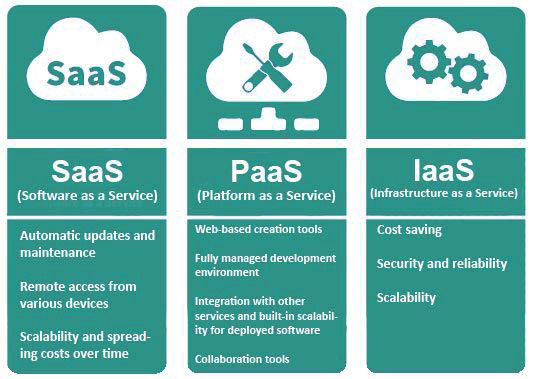
How to find the best cloud host?

You don’t need to choose the most expensive cloud hosts on the internet if it’s for personal websites. There are few features to check before choosing your cloud host.
First, you need to gather as much information as possible about its data centers and infrastructures:
- Do its servers use SSDs?
- Where are its servers located?
- What is the level of security of its data centers?
You may find answers to these questions on the websites of the cloud host that you have chosen. However, this it’s not always the case.
Note: Sometimes, it will be impossible with some cloud hosts to find the location of the servers, as well as the details of the infrastructures. In general, when this information isn’t found, it means that the host rents its own servers in another company’s data center.
Server infrastructure
Hard drives are slower than SSDs. Therefore, the latter, that stands for Solid State Drive, is the best choice. The former may take two forms: SAS or SATA. Pay close attention to these indications. Every cloud host that provides with SSD will mention it on its website.
Security features
Also, have a look at the security features since your data is alongside other users’ data. The risks are greater than with dedicated servers. Several servers welcome your data, which means that your data is accessible on many servers. Therefore, it’s riskier than with shared hosting. The security features are really important to check.
Ressources included
With any type of web hosting, the resources offered are important. Do not believe the “unlimited disk space” mentions because in reality there are limits in reality. If you exceed it, you’ll be kindly asked to upgrade your offer.
Also, note that with cloud hosting, the resources allocated to your website will always adapt to the traffic, which a great point.
User-friendly control panel
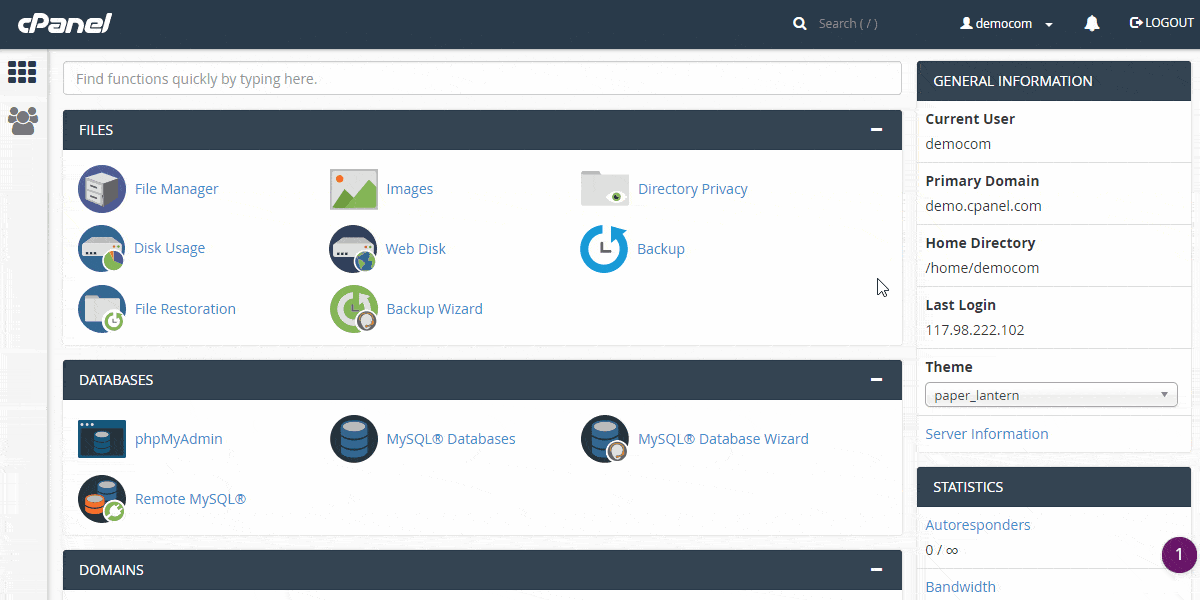
Also, pay close attention to the control panel. It’s extremely important for any type of configuration. It needs to adaptable to your website. Is it user-friendly or not?
Uptime guarantees
Shared web hosting often offers fewer availability guarantees than cloud hosting since the data is available in one single server, not many (as it is with cloud hosting). Therefore, with cloud hosting, your website always remains online since the shutdown of a server will be compensated by another server.
Free cloud hosting, it exists!
 Cloud hosting is free with few companies: AWS and Google Cloud Platform for instance. They both offer PaaS and IaaS models.
Cloud hosting is free with few companies: AWS and Google Cloud Platform for instance. They both offer PaaS and IaaS models.
Amazon Web Services
It’s one of the most popular options for developers since it gives them full control of the IaaS model. You’re often provided with 12 free months with the free level.
Google Cloud Platform
You’re also offered a free plan, which allows you to create and test several applications. Google Cloud is extremely scalable, just like cloud hosting. You’re offered a certain amount of credits or 12 months to try this platform.
Microsoft Azure
This is also an option that has PaaS and IaaS models that many people chose to use because it has both “managed” and “unmanaged” services. Therefore, customers that choose Microsoft Azure for their Cloud hosting have more control over their websites.
Free trials
Advantages and disadvantages of cloud hosting

Shared hosting wasn’t made obsolete by cloud hosting, as it was predicted. Sometimes, people even prefer shared hosting, for its price for example. Also, it’s harder to compare cloud hosting plans than shared hosting plans.
The benefits of cloud hosting
If used judiciously, hosting your site in the cloud can greatly benefit many types of online businesses. Here are some of the benefits of this technology:
Profit
It’s the most important for ROI. Companies don’t have to invest huge amounts of money to purchase and update their desktop software. The company will, therefore, save a lot of money.
Almost unlimited storage
You don’t have to worry about the storage space at all. Therefore, you can store whatever you want, without any impact on the website’s performance.
Backup and recovery
You can easily back up your data and store it on a physical device. Even the technical team of the host will help you recover your data and restore it. Therefore, you’ll be able to manage your data in a much easier way.
Automatic software integration
It usually happens automatically, which helps you integrate your customized applications very easily.
Simplified access to information
Only an internet connection will be needed to access your data. No more zone/location issues.
Rapid deployment
Also, the deployment is almost instant. All your applications/websites will be online within a few minutes. It also depends on the technology that is used and the software that is involved.
Keep in mind that you’ll be paying only for the resources that you used. You’re also able to clone/delete servers very easily without any performance issues. The expenses are reduced and the network is accessible from anywhere in the world.
What are the disadvantages of Cloud hosting?

Even if it has several benefits, cloud hosting also has disadvantages that are important to know for small companies.
Technical issues
You can access your data at any moment, that’s true. But it’s often subject to breakdowns.
Susceptibility to attack
Since the data is spread over many servers, it is more vulnerable to be subject to malicious attacks.
Also, cloud hosting is sometimes twice more costly than shared hosting. Moreover, you have low control on your website and the users can’t have access to the data if there is no Internet connection. And last, you don’t have any physical control over the security of a server.
Frequently asked questions (FAQs)
It’s a very commonly used term in marketing. Cloud computing occurs in several clouds, and it’s a way to handle huge amounts of IT resources.
No. A cloud is a set of machines that are the base of several virtual machines, while the Internet is a set of machines that can communicate with each other.
Yes! Companies and individuals use cloud computing.
To define cloud computing with precision, it’s “bundled resource computing”. Usually, people think that it’s an entity that is offering them the download of data and the display of music, which is not exactly the case. In reality, millions of computers are located in real buildings are used for cloud computing.
As you know, the file uploaded on Dropbox isn’t in the sky, but it’s located in one (or more) disk drive(s) in several data centers. It costs money, uses energy and it requires space, which has impacts on the security, privacy, environmental and legality plan.
Yes. Cloud computing is common for hosting companies since it has a lot of benefits in scaling and reliability.
In general, hosting companies will mention it or use popular words to designate it.
This is why you always need to pay close attention to the services that are provided by the hosting company.

